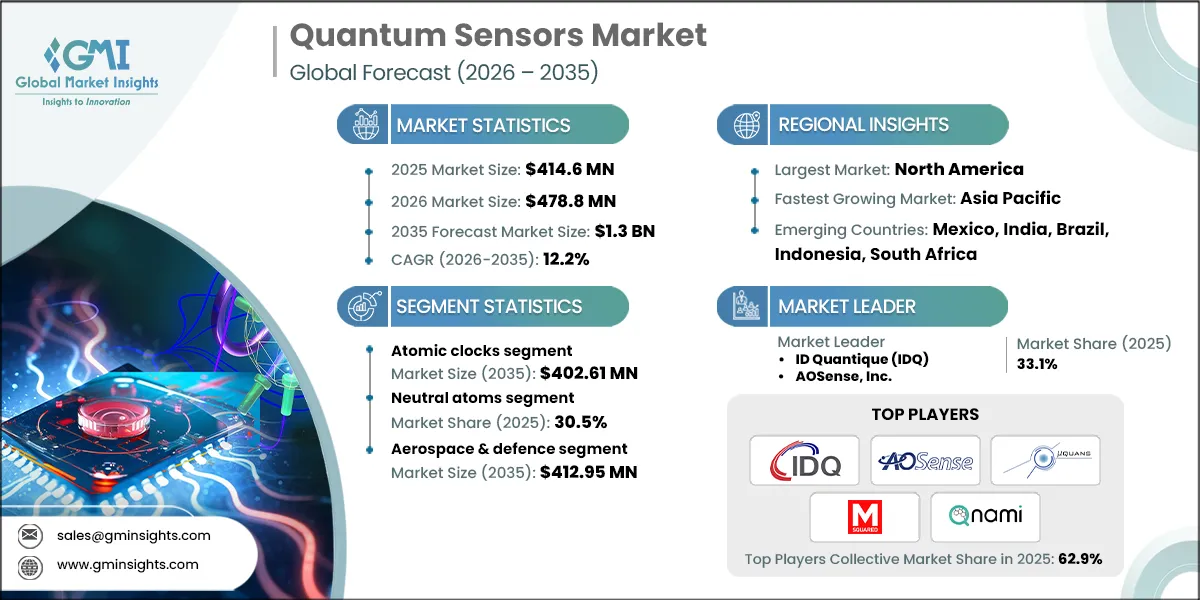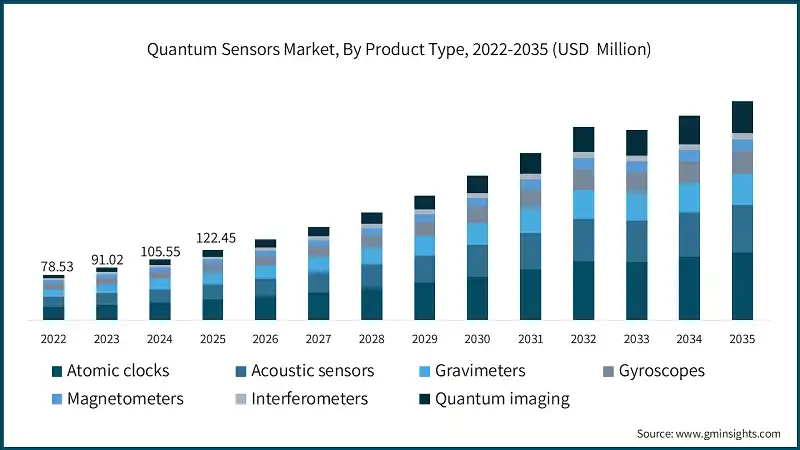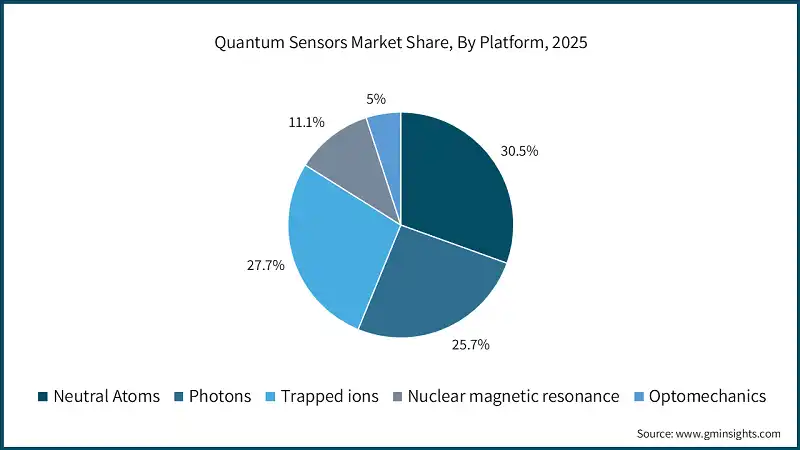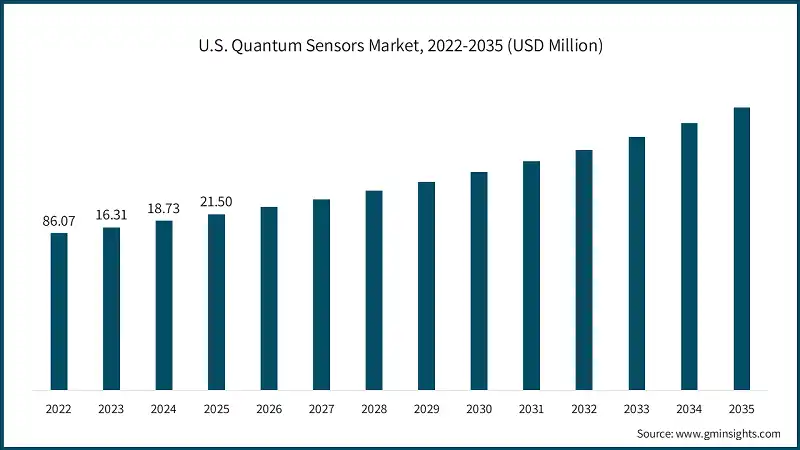Summary
Table of Content

Quantum Sensors Market
Get a free sample of this report
Form submitted successfully!
Error submitting form. Please try again.
Thank you!
Your inquiry has been received. Our team will reach out to you with the required details via email. To ensure that you don't miss their response, kindly remember to check your spam folder as well!

Request Sectional Data
Thank you!
Your inquiry has been received. Our team will reach out to you with the required details via email. To ensure that you don't miss their response, kindly remember to check your spam folder as well!
Form submitted successfully!
Error submitting form. Please try again.
Quantum Sensors Market Size
The global quantum sensors market was valued at USD 414.6 million in 2025 with a volume of 1,90,491.3 units. The market is expected to grow from USD 478.8 million in 2026 to USD 989.4 million by 2031 and USD 1.3 billion by 2035 with a volume of 6,21,993.3 units, growing at a CAGR of 11.7% and value CAGR of 12.2% during the forecast period of 2026-2035.

To get key market trends
- The expanding automotive sector, Internet of Things (IoT) and cloud integration, and the need for greater precision and advancements in quantum technologies, in addition to government support for increased funding in research and development, are driving the growth of the quantum sensors market.
- The development of quantum sensors is being driven by rapid advances in quantum technology along with related research and substantial investments. Research institutions, governments, and private entities continue to invest actively in quantum technology, facilitating breakthroughs in controlling the quantum state and enhancing sensor sensitivity, while also expanding their application domains. For example, in May 2024, the Pentagon's Defense Innovation Unit created a new portfolio aimed at integrating emerging technology into military use. This included soliciting proposals from industry regarding quantum sensors able to provide alternative PNT capabilities.
- Market growth is also driven by government initiatives, partnerships, and rising funding in R&D. In July 2025, Karnataka government announced a USD 114 million Quantum Mission to establish the state the as "quantum capital of Asia" by 2035. In conjunction with the state’s Quantum Vision 2035, the mission seeks to generate a USD 20 billion quantum economy, 10,000 high-skilled jobs, to prompt innovation, commercialization, and workforce development in the quantum computing ecosystem.
- In 2025, North America accounted for 35.5% share of the quantum sensors market. Strong government support as well as the presence of leading technology companies such as IBM and Google, considerable venture capital investment, and a well-developed talent pipeline from top universities explain the region’s market dominance.
Quantum Sensors Market Report Attributes
| Key Takeaway | Details |
|---|---|
| Market Size & Growth | |
| Base Year | 2025 |
| Market Size in 2025 | USD 414.6 Million |
| Market Size in 2026 | USD 478.8 Million |
| Forecast Period 2026 - 2035 CAGR | 12.2% |
| Market Size in 2035 | USD 1.3 Billion |
| Key Market Trends | |
| Drivers | Impact |
| Increasing demand from the automotive industry | The automotive industry is expected to drive 28% growth in quantum sensor adoption, enhancing navigation and safety systems and supporting autonomous and advanced driver-assistance technologies. |
| Rapid IoT and cloud computing integration | Integration of IoT and cloud computing could contribute 20% market growth, enabling real-time data processing and high-precision monitoring across smart infrastructure and industrial applications. |
| Demand for unprecedented precision and sensitivity | High demand for precision and sensitivity is likely to expand the market by 27%, improving reliability in defense, healthcare, navigation, imaging, and environmental monitoring. |
| Advancements in quantum technology and research initiatives | Advances in quantum technology and research are anticipated to boost market growth by 18–20%, enabling improved sensor performance, coherence control, and scalable architectures for diverse applications. |
| Supportive government initiatives, public-private partnerships and increased R&D funding | Supportive government initiatives, public-private partnerships, and increased R&D funding may contribute 15–17% growth, accelerating pilot projects, infrastructure development, and enterprise adoption of quantum sensors. |
| Pitfalls & Challenges | Impact |
| High development and maintenance cost of quantum sensor | High development and maintenance costs are limiting widespread adoption of quantum sensors, slowing deployment in commercial and industrial applications. |
| Limited availability of skilled quantum computing professionals | Limited availability of skilled quantum computing professionals is constraining research, development, and implementation, creating a bottleneck for market growth and innovation. |
| Opportunities: | Impact |
| Integration with industrial automation and smart manufacturing | Integration with industrial automation and smart manufacturing is enhancing process efficiency and precision monitoring, driving adoption of quantum sensors in factories and production lines. |
| Development of portable and miniaturized quantum sensors | Development of portable and miniaturized quantum sensors is enabling deployment in field operations and remote locations, expanding market reach and practical applications. |
| Increasing use in environmental monitoring and geospatial mapping | Increasing use in environmental monitoring and geospatial mapping is improving accuracy in data collection for climate, resource management, and urban planning, boosting demand for high-precision sensors. |
| Expansion in defense and aerospace applications | Expansion in defense and aerospace applications is enhancing navigation, surveillance, and threat detection capabilities, creating strong growth potential for quantum sensor technologies. |
| Market Leaders (2025) | |
| Market Leaders |
Top 2 players held 33.1% market share |
| Top Players |
|
| Competitive Edge |
|
| Regional Insights | |
| Largest Market | North America |
| Fastest growing market | Asia Pacific |
| Emerging countries | Mexico, India, Brazil, Indonesia, South Africa |
| Future outlook |
|
What are the growth opportunities in this market?
Quantum Sensors Market Trends
- The adoption of digital instruments across the globe is forecasted to democratize across the Asia-Pacific, Europe, and North America regions from 2025 to 2035 due to government concatenation of quantum programs and infrastructural escalation. These areas are set to become the epicenters of innovation and deployment of quantum sensors.
- Advancements in quantum sensing, which include atomic, NV center, and superconducting technologies, will increase in the 2025-2032 period. These technologies are set to provide greater sensitivity, accuracy, and reliability for use in industry, health care, and defense.
- Enhanced collaboration among technology start-ups, research centers, and large corporations will redefine the market in 2026 to 2032. These partnerships are facilitating rapid prototyping and sharing of R&D resources to fasten the commercialization of quantum sensors across various fields.
- There will be a need for standardized quantum sensing protocols coupled with secure data acquisition between 2026 and 2032. The precision, functionality, and integration of quantum sensors for industrial, medical, and IoT applications will be enhanced with new software and calibration tools.
Quantum Sensors Market Analysis

Learn more about the key segments shaping this market
On the basis of product type, the market is segmented into atomic clocks, acoustic sensors, gravimeters, gyroscopes, magnetometers, interferometers, and quantum imaging.
- The atomic clocks segment is anticipated to reach USD 402.61 million by 2035. The incomparable timing stability of atomic clocks is driving an increase in demand and facilitating advancements in navigation, telecommunications, and synchronization systems. Adoption in aerospace, defense, and infrastructure monitoring is accelerating.
- Manufacturers should focus on miniaturized, low-power atomic clock designs to support wider commercial use.
- The quantum imaging segment is anticipated to grow at a CAGR of 16.9% during the forecast period 2026 - 2035. Quantum imaging is increasingly popular because of its higher resolution and improved performance in low light and high noise environments. The technology is now more widely incorporated in various sectors, including medical imaging, security screening, and scientific research.
- Manufacturers should invest in integrating quantum imaging modules into compact, application-ready platforms to expand deployment.

Learn more about the key segments shaping this market
On the basis of platform, the quantum sensors market is divided into neutral atoms, photons, trapped ions, nuclear magnetic resonance, and optomechanics.
- The neutral atoms segment held a market share of 30.5% in 2025. Improvements in coherence control and scalable architectures are enhancing performance of neutral-atom-based sensors. High precision is provided by these sensors for environmental monitoring, field measurement, and navigation.
- Manufacturers should collaborate with research labs to optimize stability and develop field-ready neutral-atom systems.
- The trapped ions segment is anticipated to grow at a CAGR of 11.9% during the forecast period 2026 - 2035. Trapped-ion technologies are developing owing to their superior sensitivity, quantum coherence, and reliability. They are also under increasing investigation for gravimetry, magnetic field sensing, and precision timing.
- Manufacturers should invest in robust ion-trap packaging and long-duration stability to enable industrial and defense applications.
On the basis of end-use, the quantum sensors market is segmented into aerospace & defence, agriculture & environment, oil & gas, transportation, healthcare, automation, construction, and others.
- The aerospace & defence market is anticipated to reach USD 412.95 million by 2035. The aerospace and defence sector is adopting quantum sensors to enhance navigation, surveillance, detection, and communication resilience. High-precision sensing supports GPS-denied operations and advanced threat detection.
- Manufacturers need to align with defense initiatives to jointly develop rugged, high-performance quantum sensor systems.
- Healthcare segment is anticipated to grow at a CAGR of 11.3% during the forecast period 2026 - 2035. In the field of medicine, quantum sensors are becoming more popular for imaging, detecting, and monitoring biomagnetic signals, as well as improved real-time disease tracking and early disease detection.
- Manufacturers should prioritize clinically adaptable, compact quantum sensor systems that integrate easily with existing medical technologies.

Looking for region specific data?
North America quantum sensors market held 35.5% market share in 2025 and is anticipated to grow at a CAGR of 11.9% during the forecast period 2026 - 2035. Strong R&D, enterprise adoption, and government support are driving the growth of the North American quantum sensor market. The region will continue to be a center for industrial applications, precision measurement, and the deployment of advanced sensors between 2025 and 2032. Collaboration among tech firms and research institutions is accelerating commercialization.
- U.S. dominated the quantum sensors market, accounting for USD 21.50 million in the year 2025. Large investments from the public and private sectors help the U.S. to maintain a leading position in quantum technology research. In August 2023, 18 research groups secured USD 29 million in funding from the US National Science Foundation. The United States is a leader in building and adopting quantum sensors due to its supportive infrastructure and market conditions.
- Manufacturers should expand advanced sensor platforms and commercial applications to meet rising enterprise and industrial needs in the U.S.
- Canada is anticipated to grow at a 7.8% CAGR during the forecast period 2026 – 2035, driven by increasing commercial adoption and research initiatives. From 2025 through 2032, government-backed programs in collaboration with universities will propel innovation in quantum sensor technology.
- Manufacturers should partner with Canadian research institutions to develop specialized quantum sensor solutions for industrial, healthcare, and IoT applications.
Europe accounted for 28.5% of the global quantum sensors market in 2025. Due to substantial governmental funding, cross-border research initiatives, and advancements in quantum technologies, Europe’s quantum sensor market is experiencing growth. The region is focusing on the commercialization of scalable quantum sensor systems, with nations concentrating on atomic, NV center, and superconducting sensor technologies.
- Germany is anticipated to grow at a 11.4% CAGR during the forecast period 2026 - 2035. Germany is strengthening its position in the European quantum sensor market through heavy investments in R&D infrastructure, public-private collaborations, and industrial integration.
- Manufacturers should collaborate with industrial partners in Germany to develop high-precision, reliable quantum sensors for commercial and research applications.
- UK's quantum sensors market is anticipated to reach USD 79.72 million by 2035. The UK is emerging as a leader in quantum sensor technology, with strong emphasis on silicon-based and integrated sensor systems.
- Manufacturers should utilize the UK’s semiconductor and research infrastructure to scale production and deployment of advanced quantum sensors.
Asia-Pacific held a share of 24.5% in the global quantum sensors market and is the fastest-growing region with a 13.8% CAGR during the forecast period. The Asia-Pacific quantum sensor market is growing steadily, driven by increasing government support, academic collaborations, and rising enterprise adoption.
- The quantum sensors market in China is anticipated to reach USD 98.83 million by the year 2035. The development of high-performance hardware and the creation of scalable ecosystems have made China one of the leading markets for quantum sensors. In November of 2025, China made a rapid shift in the Industrialization of Quantum Technology by concentrating on the establishment of strong domestic supply chains and Industrial Ecosystems.
- Manufacturers are encouraged to form strategic alliances in technology to support the localization efforts in line with China’s focus on domestic production of sensors.
- Japan's quantum sensors market was valued at USD 21.28 million in 2025. Japan is enhancing superconducting quantum technologies, NV center, and photonic quantum sensors due to the continuous cooperation from the public sector, academia, and the private sector. Japan has prioritized the accuracy, stability, and integration of these sensors to meet the demands of the industry and the medical field.
- Manufacturers should strengthen partnerships with Japanese technology firms and research institutions to co-develop application-specific quantum sensors.
- India's quantum sensors market is anticipated to grow at a CAGR of over 12.1% during the forecast period. India is rapidly advancing in quantum sensor research, with government-backed programs promoting applied development and prototype creation. The emphasis is on building localized R&D capabilities and deploying sensors for industrial, defense, and digital infrastructure applications.
- Manufacturers should partner with Indian research centers to set up local R&D and develop quantum sensor platforms tailored for industrial and applied applications.
Latin America quantum sensors market held 5.8% share in 2025 and is anticipated to grow at a 7.8% CAGR during the forecast period. Quantum sensors are becoming increasingly in demand in the healthcare, defense, and industrial sectors in Latin America and are contributing to the region's growth. Manufacturers need to work with domestic researchers and industry players to adapt the quantum sensors to local needs and to broaden their distribution.
In 2025, the Middle East and Africa quantum sensors market held a share of 5.7% and is anticipated to grow at a 10.8% CAGR during the forecast period 2026 - 2035. The MEA market is growing steadily, driven by defense, aerospace, and energy sector applications. Public funding of research facilities and technology are also assisting in the regional uptake and the development of advanced quantum sensing technologies.
- Saudi Arabia accounted for an 47.4% market share in 2025. Saudi Arabia is advancing in the market through growing investments in defense, energy, and national infrastructure. The Saudi government supports adoption of high-precision sensing technologies through innovation programs.
- Manufacturers should work with local innovation hubs to support pilot deployments and capability development.
- The South Africa market is anticipated to grow at a CAGR of 10% during the forecast period. South Africa is gradually building momentum in quantum sensor research, supported by academic initiatives and rising interest in advanced measurement technologies for mining, environmental monitoring, and scientific applications.
- Manufacturers should collaborate with South African universities and research labs to co-develop applied sensing solutions.
- The UAE accounted for a share of 20.1% in the market in 2025. The UAE has become one of the strongest adopters of quantum sensors due to the Country's Innovation Strategy, the investment in aerospace, security, and smart infrastructure.
- To facilitate the accelerated integration and widespread implementation of quantum sensing systems, manufacturers need to collaborate with technology initiatives and public administrations in the UAE.
Quantum Sensors Market Share
The key players in the market are ID Quantique (IDQ), AOSense, Inc., Muquans (μQuans), M Squared Lasers Ltd., and Qnami. Collectively, these companies held more than 62.9% of the market in 2025.
- ID Quantique (IDQ) led the quantum sensors market with a 17.9% share in 2025. The company has expertise in single-photon detection and quantum random number generation in quantum communication and sensing. The company has a strong position in the market due to partnerships with the government and deployments in the fields of security, metrology, and research.
- AOSense, Inc. held a 15.2% market share in 2025. The company is deploying atom-interferometry-based sensors in navigation, gravimetry, and timing. AOSense’s attributes in quantum systems and strong alliances with defence and aerospace entities reinforce the firm's position in the market.
- Muquans (μQuans) captured 12.1% of the market in 2025. The company has high-performance quantum gravimeters, atomic clocks, and laser systems, with precision measurement technologies. The seamless integration within scientific laboratories and the industrial users, are the key contributors to the growing influence of the firm within the quantum sensing ecosystem.
- M Squared Lasers held a 9.9% market share in 2025. The advanced laser platforms developed by the company facilitate quantum sensing, metrology, and cold atom Applications. The company is also able to focus on next-generation quantum sensor development due to the company’s strong R&D and collaborations with research institutions worldwide.
- Qnami accounted for 7.8% of the market in 2025. The company develops diamond-based quantum sensing and excellent magnetic field sensitivity devices for nanoscale imaging and materials characterization. A position in the market is supported by partnerships in the semiconductor research industry and Qnami's specialization in NV-center technology.
Quantum Sensors Market Companies
Major players operating in the quantum sensors industry are:
- AOSense Inc.
- Apogee Instruments
- Atomionics
- Campbell Scientific, Inc.
- ID Quantique SA
- Kipp & Zonen
- LI-COR, Inc.
- ID Quantique (IDQ), AOSense, Inc., Muquans (μQuans), M Squared Lasers Ltd., and Qnami are considered leaders in the quantum sensors market. The company's leading position in high-precision industrial quantum sensors is supported by their continual advancement in quantum sensor production, strategic partnerships with research bodies, defense institutions, and industry competition, and extensive research and development efforts.
- Apogee Instruments, Atomionics, Campbell Scientific, Inc., Nomad Atomics, and Kipp & Zonen are categorized as challengers. These companies compete through specialized quantum and optical sensor solutions, diversified product offerings for scientific, environmental, and industrial applications, and strong integration with research and commercial users to expand their market presence.
- LI-COR, Inc., Skye Instruments Ltd, and Solar Light Company, LLC. are categorized as followers. Their strengths include cost-effective designs, tailored product offerings, and niche applications in environmental monitoring, laboratory research, and precision measurement. While innovation at these companies is limited, they still cater to smaller-scale industrial and academic markets.
- Atomionics is acknowledged as a niche player in the market. Specialized quantum sensor systems for specific scientific and industrial use cases are designed and built by the company utilizing their proprietary technology to perform tailored business integrations and establishing unique market differentiators.
Quantum Sensors Industry News
- In November 2025, India announced plans to establish two quantum fabrication and central facilities at the Indian Institute of Technology (IIT) Bombay and the Indian Institute of Science (IISc) Bengaluru as part of the National Quantum Mission (NQM).
- In October 2023, IDQ and SK Telecom completed five years of collaboration. The two companies joined forces to accelerate the market adoption of quantum-safe security and quantum sensing solutions. Over the past five years, ID Quantique and SK Telecom delivered several innovative projects, beginning in 2019 when IDQ’s Quantum Key Distribution (QKD) technology was deployed over SK Telecom’s 5G backbone.
The quantum sensors market research report includes in-depth coverage of the industry with estimates & forecasts in terms of revenue (USD Million) and volume (Units) from 2022 to 2035, for the following segments:
Market, By Type
- Atomic clocks
- Magnetometers
- Gravimeters
- Gyroscopes
- Acoustic sensors
- Interferometers
- Quantum imaging
Market, By Platform
- Neutral atoms
- Photons
- Trapped ions
- Nuclear magnetic resonance
- Optomechanics
Market, By End Use
- Aerospace & defence
- Agriculture & environment
- Oil & gas
- Transportation
- Healthcare
- Automation
- Construction
- Others
Market, By Application
- Environmental monitoring
- Medical imaging
- Precision measurement
- LiDAR
The above information is provided for the following regions and countries:
- North America
- U.S.
- Canada
- Europe
- Germany
- UK
- France
- Spain
- Italy
- Netherlands
- Asia Pacific
- China
- India
- Japan
- Australia
- South Korea
- Latin America
- Brazil
- Mexico
- Argentina
- Middle East and Africa
- Saudi Arabia
- South Africa
- UAE
Frequently Asked Question(FAQ) :
Which product type dominates the quantum sensors industry?
Atomic clocks represent a leading product category within the industry. Market demand is driven by their unmatched timing stability for navigation, telecommunications, and defense applications.
What is the market size of the quantum sensors industry in 2025?
The market was valued at USD 414.6 million in 2025. Market growth is driven by rising demand for high-precision sensing across defense, aerospace, healthcare, and industrial monitoring applications.
What is the projected size of the quantum sensors market in 2026?
The market is projected to reach USD 478.8 million in 2026. Industry expansion is supported by rapid integration of IoT, cloud computing, and advanced quantum technologies.
What is the projected value of the quantum sensors market by 2035?
The market is expected to reach USD 1.3 billion by 2035. Strong market growth is supported by a CAGR of 11.7% due to advancements in quantum research, sensor miniaturization, and increasing commercial adoption.
Which platform segment holds the largest share in the quantum sensors market?
Neutral atom platforms held a 30.5% market share in 2025. Industry adoption is supported by high precision, improved coherence control, and scalability for environmental monitoring and navigation systems.
Which end-use segment dominates the quantum sensors industry?
Aerospace and defense dominate the market. Industry growth is driven by increasing deployment in GPS-denied navigation, surveillance, and advanced threat detection systems.
Which region leads the quantum sensors market?
North America accounted for 35.5% of the global market in 2025. Regional market leadership is driven by strong government funding, advanced R&D infrastructure, and the presence of leading quantum technology companies.
What is the U.S. quantum sensors market size in 2025?
The U.S. market was valued at USD 21.50 million in 2025. Market growth is supported by significant public and private investments, defense programs, and strong research ecosystem development.
What are the key trends shaping the quantum sensors industry?
Key industry trends include sensor miniaturization, integration with IoT and cloud platforms, and increasing use in environmental monitoring and industrial automation. These trends are accelerating commercialization and expanding real-world deployment of quantum sensor technologies.
Who are the key players in the quantum sensors market?
Key players in the industry include ID Quantique (IDQ), AOSense Inc., Muquans (μQuans), M Squared Lasers Ltd., and Qnami. Collectively, these companies held over 62.9% of the global market share in 2025, reflecting a highly concentrated competitive landscape.
Quantum Sensors Market Scope
Related Reports


